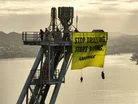Who Blinked First in Shell's Legal Battle With Greenpeace?

Shell has concluded its lawsuit against Greenpeace, ending a legal battle that has spanned more than a year.
The case, in which the oil and gas giant sought US$2.1 million in damages, was one of the largest legal threats faced by the global environmental organisation.
The dispute stemmed from a dramatic protest in which Greenpeace activists occupied a moving Shell oil platform for nearly two weeks as it journeyed from the Canary Islands to Norway.
This legal standoff has now been resolved through an out-of-court settlement.
Greenpeace will neither admit liability nor pay Shell any damages. Instead, the organisation has agreed to donate £300,000 (US$382,500) to the Royal National Lifeboat Institution (RNLI), a UK charity focused on sea rescue operations.
Understanding Shell’s case against Greenpeace
The dispute dates back to January 2023, when six Greenpeace activists boarded the White Marlin, a Shell-operated floating production vessel, off the Canary Islands.
Using inflatable boats to reach the ship, the group aimed to protest against fossil fuel extraction and oil drilling.
Shell’s response was swift. The company filed a lawsuit, claiming the protest posed significant safety risks, including danger to the activists’ lives and the vessel’s crew.
Greenpeace countered by accusing Shell of using “bullying tactics” to suppress peaceful protest.
The out-of-court settlement includes a legal agreement restricting Greenpeace from conducting similar actions near key oil and gas platforms in the North Sea for five to 10 years.
What Is Greenpeace?
Greenpeace, established more than 50 years ago, campaigns for environmental and social causes.
Its mission is to “ensure the ability of the Earth to nurture life in all its diversity.”
The group tackles a wide range of global issues, including climate change, deforestation, and nuclear disarmament.
Known for its high-profile direct actions, Greenpeace engages in advocacy, research and ecotage — sabotage aimed at protecting the environment.
Unlike many organisations, it does not accept funding from governments, corporations or political parties. Instead, its activism is supported by individual donors and foundation grants.
Areeba Hamid, Co-Executive Director of Greenpeace UK, said: “This settlement shows that people power works. Thousands of ordinary people across the country backed our fight against Shell and their support means we stay independent and can keep holding big oil to account.
“We’ve ensured not a penny of our supporters’ money will go to Shell and all funds raised will be used to continue campaigning against the fossil fuel industry and other big polluters.
“This legal battle might be over, but big oil’s dirty tricks aren’t going away. With Greenpeace facing further legal battles around the world, we won’t stop campaigning until the fossil fuel industry stops drilling and starts paying for the damage it is causing to people and planet.”
Shell’s Perspective on the Settlement
Shell expressed satisfaction with the resolution of the case and praised Greenpeace’s contribution to the RNLI.
In a statement, the company reiterated its position on the protest.
“For Shell, the right to protest is fundamental and has never been at issue. Instead, this case was about an illegal boarding by protesters which a high court judge described as ‘putting their lives and, indirectly, the lives of the crew at risk’.
“He was also clear that Greenpeace could still protest from a safe distance and their human rights were not infringed.”
Make sure you check out the latest industry news and insights at ClimateTech Digital and be part of the conversation at our global conference series, Sustainability LIVE.
Discover all our upcoming events and secure your tickets today. Subscribe to the ClimateTech Digital newsletter.
ClimateTech Digital is a BizClik brand



